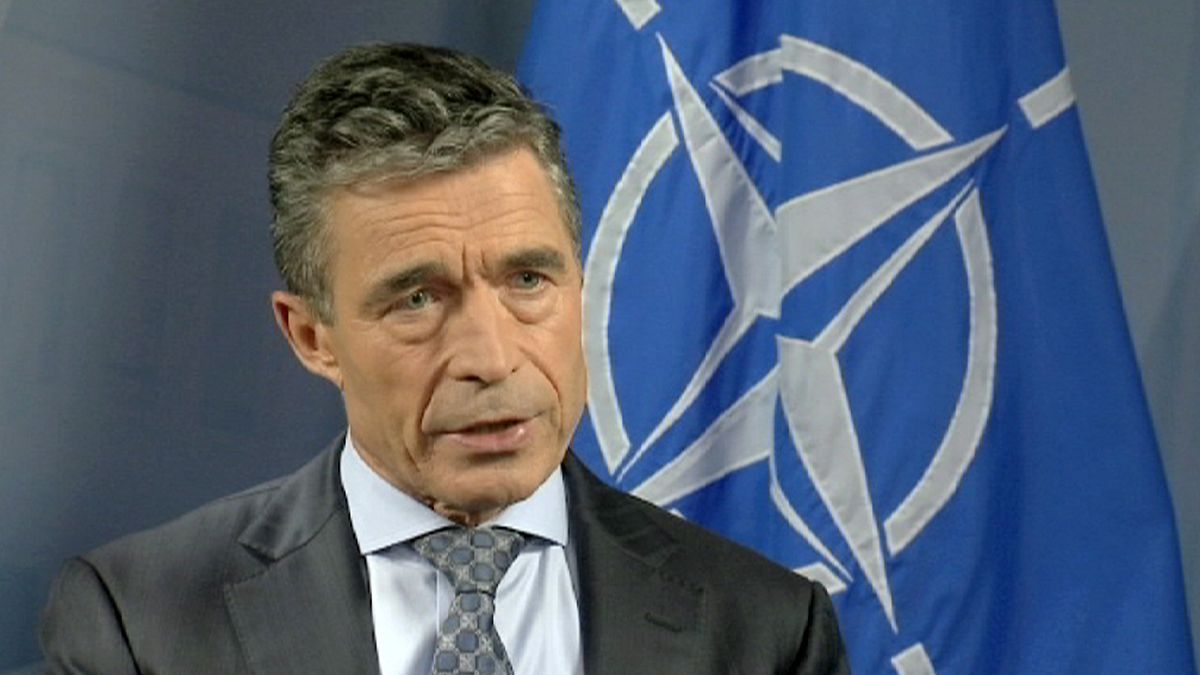The past five years have been extremely eventful for NATO’s Secretary General Anders Fogh Rasmussen. Now as he approaches the end of his mandate, euronews spoke to him about the alliance’s future.
Andrei Beketov, euronews: How do you assess the security situation in Europe over the past months?
Anders Fogh Rasmussen: “The security environment has changed dramatically. Russia’s illegal military actions in Ukraine are a wake-up call. They have reminded us that we can not take security for granted. So of course we have to adapt to this new situation.”
euronews: President Putin said this week that he had no right to let NATO forces into Crimea. That’s why it was annexed. Did you take into consideration this sort of Russia’s security concerns?
Rasmussen: “Yeah, but we never had any intention to deploy NATO troops to Crimea. So it’s a very very bad excuse for what is an illegal and illegitimate annexation of Crimea into the Russian Federation. There is no excuse. Russia is in blatant breach of all its international commitments and also in breach of the fundamental principles of NATO-Russia cooperation.”
euronews: How do you see Russia’s involvement in eastern Ukraine? And what about the armed stand-off there?
Rasmussen: “There is no doubt that Russia is heavily involved in destabilising the eastern part of Ukraine. They allow a flow of weapons and equipment and also fighters across the border into Ukraine. We call on Russia to stop supporting the separatist groups. And we call on Russia to withdraw troops from the Russia-Ukraine border. We have seen recently a new build-up of Russian troops in the border region.”
euronews: Is NATO boosting its presence in the vicinity of Russia?
Rasmussen: “We have enhanced air policing over the three Baltic states, deployed naval vessels to the Baltic Sea and the Black Sea, we have conducted more exercises in Poland and the Baltic states. So, at sea, in the air, on the ground you see more NATO presence. It’s not offensive, it’s purely defensive with the aim to ensure effective protection of our allies.”
euronews: How would you describe Russia; as a partner or now more as an adversary?
Rasmussen: “Actually we have spent more then 20 years trying to build a constructive relationship with Russia. But I have to say that Russia doesn’t behave as a partner. And we can see in the Russian military documents that they consider NATO an adversary, so of course we have to adapt to that.”
euronews: What lessons can be learnt from Russia’s military tactics vis a vis Ukraine?
Rasmussen: “We have seen Russian armed forces act very swiftly. We have seen more modern Russian armed forces compared to what we saw when they attacked Georgia in 2008. And this is a reason why I urge NATO allies to increase defence spending and step up modernisation of our armed forces. During the last five years Russia has increased its defence spending by 50 percent while NATO countries in average have decreased their defence spending by 20 percent. Of course that’s not sustainable. What we have seen in Ukraine is a game changer. And it’s now time to stop the cuts, reverse the trend and gradually increase defence spending.”
euronews: How do you assess the security situation in Europe? What sort of a threat do you think is coming from the Sunni insurgent group that has captured parts of Iraq and Syria. What can NATO do about it?
Rasmussen: “Again, NATO is focused on defence and protection of our allies. That’s why we have deployed Patriot missiles to Turkey to protect Turkey against possible missile attacks from Syria. But, of course in general, the situation in the region is a matter of grave concern. It is publicly known the Iraqi government has requested assistance from individual NATO allies.”
euronews: We can see aircraft from Iran and from Russia operating alongside Americans. Does it mean that NATO is already working with these countries?
Rasmussen: “It’s not NATO as an alliance, but individual NATO allies are engaged. What you see now is really how much the international community as such is concerned about this situation and the spread of extremism and terrorism. It requires a unified response from the international community across traditional lines of division.”
euronews: Now, the final question to you as an outgoing NATO Secretary General. What was your main achievement?
Rasmussen: “We have a stronger, fitter and faster NATO. Despite cuts in defence budgets you see a much stronger alliance today. Because of our operations in Afghanistan, Kosovo and elsewhere our armed forces are now used to working and operating together, they are more tightly connected then ever and more combat ready then we have ever seen. At the same time we have invested in new capabilities. Among other things we have started building missile defence. We have decided also to strengthen our cyber defence. So all in all we have, I would say, cut fat and built muscle. So you see a much stronger NATO today.”
